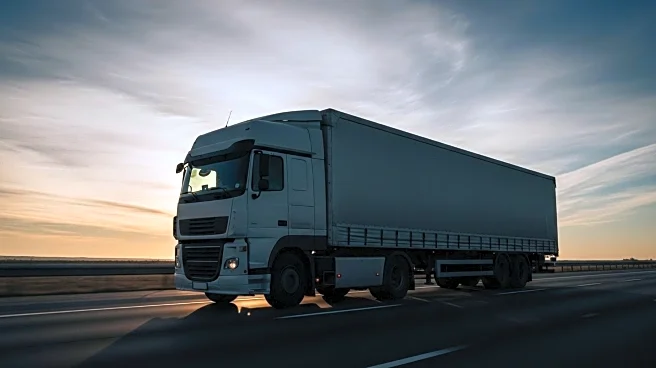What is the story about?
What's Happening?
The trucking industry is experiencing significant changes as it adapts to new demands and challenges. According to a recent survey, trucking companies are increasingly offering a variety of services, with logistics services seeing an 11-point increase from 2024. Expedited delivery services have also risen from 49% to 63% over the past two years. However, the industry faces several challenges, including driver-related issues, which have surged by 23 percentage points to 70%. Insurance costs, price pressures, and rising equipment costs are also major concerns. Shippers are particularly worried about transportation costs, which remain their biggest challenge at 74%. Cargo theft and security concerns have dramatically increased from 12% in 2023 to 48% in 2025. The survey highlights the impact of ongoing tariff policy changes, contributing to supply chain disruptions.
Why It's Important?
The developments in the trucking industry have significant implications for the U.S. economy and supply chain management. Rising transportation costs and security concerns could lead to increased prices for consumers and affect the profitability of businesses relying on trucking services. The growth in logistics services and expedited delivery offerings reflects the industry's adaptation to consumer demands for faster deliveries, influenced by major players like Amazon. However, the challenges related to driver recruitment and retention could hinder the industry's ability to meet these demands efficiently. The increase in cargo theft and security issues underscores the need for enhanced security measures, which could lead to higher operational costs. These factors collectively impact the competitiveness and sustainability of the trucking industry, influencing broader economic trends.
What's Next?
The trucking industry may need to implement strategic measures to address driver-related challenges, such as improved recruitment and training programs. Companies might also invest in advanced security technologies to mitigate the rising threat of cargo theft. As tariff policies continue to evolve, businesses will need to adapt their supply chain strategies to manage disruptions effectively. The focus on logistics services and expedited delivery is likely to continue, driven by consumer expectations for rapid service. Stakeholders, including policymakers, may need to consider legislative measures that support infrastructure development and address driver mandates to ensure the industry's growth and stability.
Beyond the Headlines
The trucking industry's shift towards offering more logistics services and expedited deliveries reflects broader trends in consumer behavior and technological advancements. The decline in sustainability requirements and electric vehicle challenges suggests a shift in policy focus, potentially affecting long-term environmental goals. The industry's adaptation to these changes could influence future regulatory frameworks and investment priorities. Additionally, the emphasis on security and cost management highlights the need for innovative solutions to balance efficiency and safety in logistics operations.

















